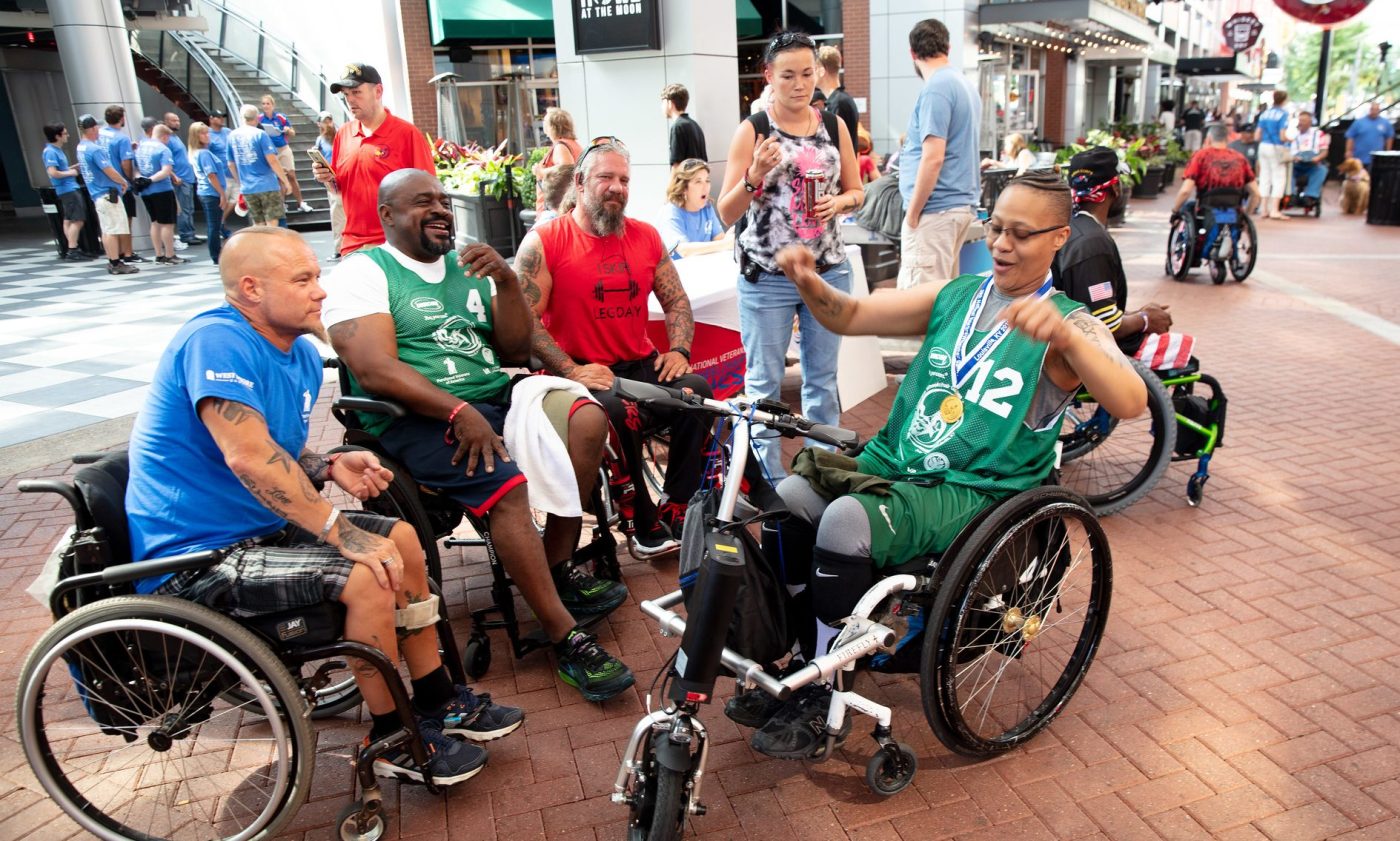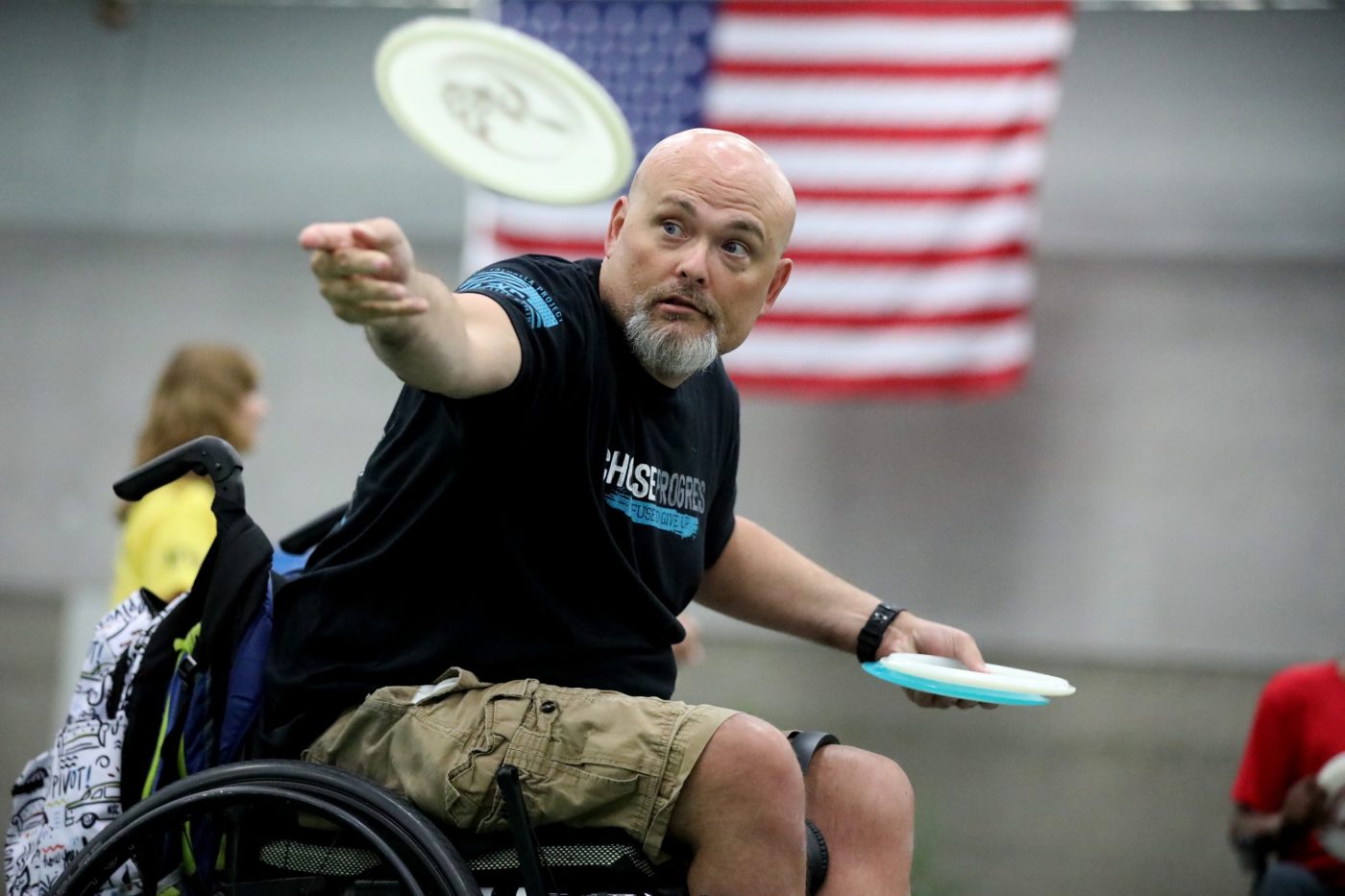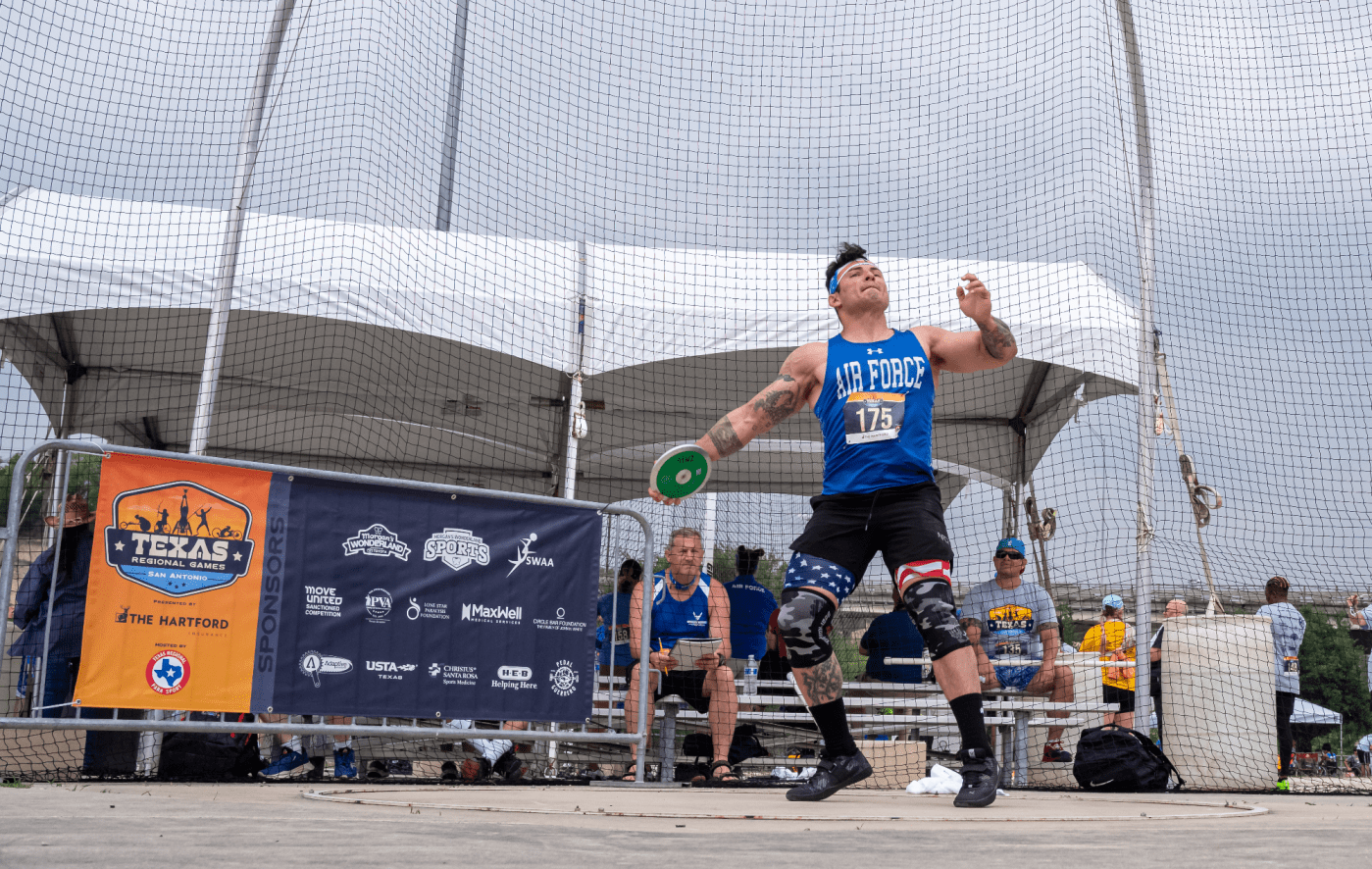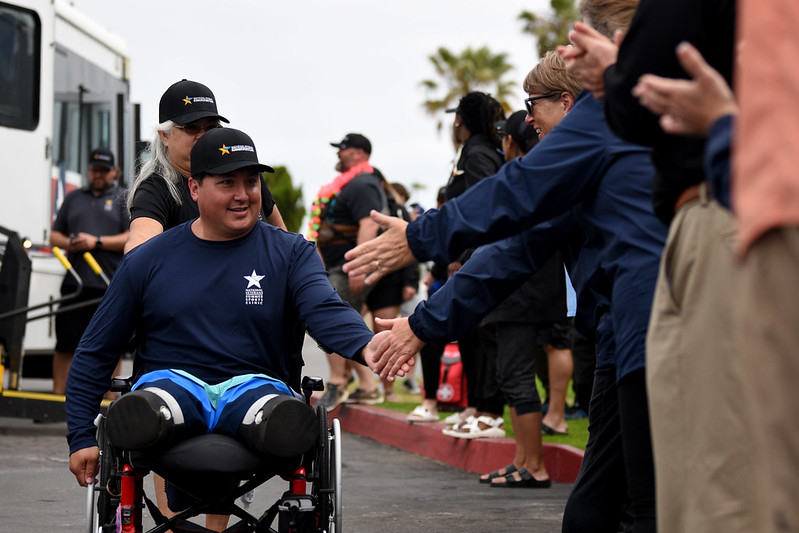Sport. The crowd’s roar. Friendship. Camaraderie.
No matter the reason, where they came from, or what sport they played, each Veteran at the 2019 National Veterans Wheelchair Games in Louisville, Kentucky, brought a unique perspective. Beyond the spirit of competition, the games help connect Veterans with adaptive sports events in their community and is part of their overall therapy and healing.
These are some of their stories.
The Games helped her beat depression

Veteran Deborah Freed talks with Marine Veteran and VA Veteran Experience Office employee Gil Stubbs about VA benefits during the games.
Living in a wheelchair didn’t set Deborah Freed back, but when she didn’t get into her second year of law school, it sent her into depression.
Then she went to VA for her annual spinal cord injury exam when she saw a poster for the National Veterans Wheelchair Games.
“Adaptive sports saved my life,” said the Air Force Veteran. “We were not in the best financial shape, but I looked at Joy (her partner) and asked if we could please do this and she agreed. I got in touch with the local Paralyzed Veterans of America chapter, became a volunteer and went to my first Games in 2004.”
Freed served in the Air Force from 1981 to 1985. While serving, she suffered two significant injuries and a third after she left the military. By 1994, she was in a wheelchair.
She uses the VA Boston Healthcare System for care, including the Women Veterans program and Spinal Cord Injury clinic.
“We got the best, I don’t care what anybody says!”
Freed, part of the New England Veterans team, currently competes in air rifle, hand cycling, bowling and archery events, just started indoor rowing this past January, and is working toward outdoor rowing. She’s attended 13 national games since 2004 and plans to attend the 40th event in Portland in 2020.
Veteran shines as slalom hero
Steep hills, no ramps and bumpy roads. Vietnam-era Veteran Ulysses Albritton thought it might be too much. But just when he was about to stop, the crowd pushed him on.
What might seem like minor inconveniences for some can be difficult obstacles that prevent those in wheelchairs from getting from Point A to Point B.
For a group of athletes at the Wheelchair Games, they take these everyday obstacles and turn it into one of the most popular events – wheelchair slalom.
Athletes navigate through mazes of sand, rocks and hairpin turns. It requires speed and chair control, and a chance to test their mettle.
Albritton receives care at the Carl Vinson VA Medical Center in Dublin, Georgia. His journey, like many of the Veteran athletes at the Wheelchair Games, started with being angry. Losing mobility is not only a drastic physical change, but emotional change that someone has to work through.
Due toe debilitating health, Albritton uses only one finger to navigate his power chair. When this course got too hard, he almost bowed out and let someone else take a crack. The crowd felt otherwise. They filled the hall of the Kentucky International Convention Center with cheers, whistles, applause and some tears to encourage Albritton to keep pushing toward the finish.
“Man, those volunteers were not going to let me quit,” he said. “It took me a half hour, but I did finish.” He said he’s glad he did since his family traveled from Kansas to Kentucky to see him participate.
“I said I would give ’em 10 years,” he said. “I had a great time and I’ve been coming back ever since.”
His dog saved his life, now he’s helping others
Air Force Veteran James Tipton pulled the seatbelt tight around his waist and rolled to the water’s edge. Just one more push and the wheels of his chair would topple over the edge and sink him to the bottom of the pool.
That’s when Scooter, a Grand Pyrenees with shaggy black and white fur, jumped into his chair and smacked her head against his chin.
“I was just done,” he said. “I don’t even know how I got in that state of mind, but I’m on the edge of the pool when she jumps up and gets in my face. That’s a big dog. Then I realized what was going on. She knew. I cut the seatbelt and hugged her. I realize I’m ready to cry now, but she taught me how precious life is.”
Tipton–who goes by Tip–spent a career in the active Air Force and Air National Guard, with multiple trips to Kuwait, Saudi Arabia and other locations. As an ammo troop working in the bomb dump, his body took a beating, but he came home relatively unscathed. Three days after getting home from deployment in 2016, he was hit head-on by a driver running a stop sign.
“And it put me in this chair,” he said. “It made me start hating life.”
Two years ago, he made it to his first Wheelchair Games, unsure of what he could do, and thinking his athletic life was over.
“I thought, ‘I’m not fit. I’m not a wheelchair athlete.’ That’s when Earl Henderson grabbed my arm and says, ‘Tip, just embrace. Embrace it.’ And it was amazing.”
Through the Games, Tipton said he realized he suffered for years with undiagnosed post-traumatic stress, and found it was OK to ask for help.
Tipton lost his home in Hurricane Michael and was living out of his RV the past few months. While fixing that to sell, it caught fire and burned to the ground the week before the games.
“I almost didn’t make it, but then I remembered those words–just embrace,” he said. “I had to come back. I had to be the Earl Anderson for the next new veteran in a wheelchair out there. We’ve got to keep paying it forward.”
To all the Veterans who showed grit and determination, we salute you.
For more information, follow Sports4Vets on social media and stay tuned to the Wheelchair Games web site.
Topics in this story
More Stories
Veterans and volunteers interested in registering online for the 43rd National Veterans Wheelchair Games (NVWG) can do so now through April 5, 2024.
Last year, Move United hosted 26 adaptive sports competitions in 22 states for 1,537 individual athletes. This year, that number is increasing to 35 events in 24 states for even more Veteran athletes.
Registration for the National Veterans Summer Sports Clinic (NVSSC) opens on Dec. 1, 2023, and runs through March 1, 2024. The 2024 NVSSC will take place August 25-30 in San Diego, California, offering an extended opportunity for Veterans to partake in adaptive sports.








